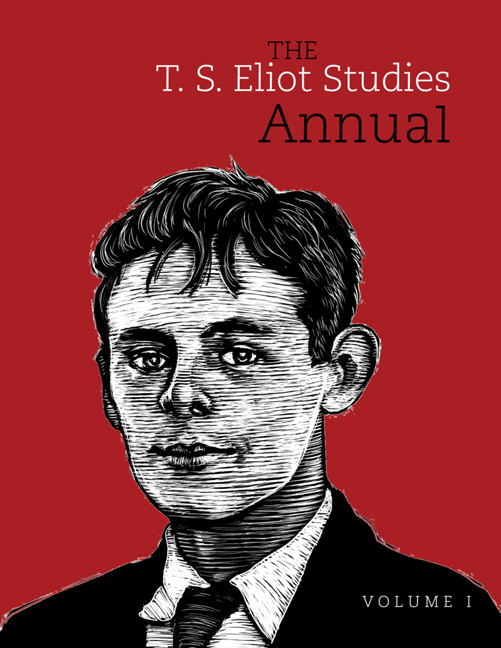Book contents
- Frontmatter
- Contents
- Abbreviations of Works
- General Editor's Note
- The Short and Surprisingly Private Life of King Bolo: Eliot's Bawdy Poems and Their Audiences
- Dull Tom-Tom's Absurd Prelude: Ludic Modernism in Early T. S. Eliot
- Eliot at Bergson's Lectures, 1910–1911
- The American Legacy of “Prufrock”
- Poetry (June 1915)
- The Stale Dregs of Revolt
- Prufrock, Belated
- Eliot's Allusive Legacy and Obscurity in “Prufrock”
- Transmuting F. H. Bradley: T. S. Eliot's Notes Towards a Theory of Poetry
- T. S. Eliot, Phenomenologist
- Astride the Dark Horse: T. S. Eliot and the Lloyds Bank Intelligence Department
- Aristophanic Structures in Sweeney Agonistes, “The Hollow Men,” and Murder in the Cathedral
- Eliot and Virgil in Love and War
- T. S. Eliot Bibliography 2014
- Notes on Contributors
The Short and Surprisingly Private Life of King Bolo: Eliot's Bawdy Poems and Their Audiences
- Frontmatter
- Contents
- Abbreviations of Works
- General Editor's Note
- The Short and Surprisingly Private Life of King Bolo: Eliot's Bawdy Poems and Their Audiences
- Dull Tom-Tom's Absurd Prelude: Ludic Modernism in Early T. S. Eliot
- Eliot at Bergson's Lectures, 1910–1911
- The American Legacy of “Prufrock”
- Poetry (June 1915)
- The Stale Dregs of Revolt
- Prufrock, Belated
- Eliot's Allusive Legacy and Obscurity in “Prufrock”
- Transmuting F. H. Bradley: T. S. Eliot's Notes Towards a Theory of Poetry
- T. S. Eliot, Phenomenologist
- Astride the Dark Horse: T. S. Eliot and the Lloyds Bank Intelligence Department
- Aristophanic Structures in Sweeney Agonistes, “The Hollow Men,” and Murder in the Cathedral
- Eliot and Virgil in Love and War
- T. S. Eliot Bibliography 2014
- Notes on Contributors
Summary
Intimations of Eliot's bawdy verses started to leak out during the author's lifetime. Confidants of the poet teased the public about their existence, and Eliot himself joked with interviewers about a character named King Bolo. In the 1980s, biographies and a volume of letters offered the first idea of the scope of the obscene verse. And then, in 1996, Inventions of the March Hare was published. In an appendix judiciously labeled “Poems excised from the Notebook,” the editor reproduced several pages of obscene verse—including the Columbo and Bolo poems—that Eliot had torn out before selling the notebook to John Quinn. Reviewed in the popular press and dissected in scholarly journals, these poems became notorious for their scatological and pornographic content, and more troublingly, for the violence, racism, misogyny, and homophobia of such lines as: “The only doctor in his town / Was a bastard jew named Benny” and “‘Up from Possum Stew!’ / Or ‘How I set the nigger free!’” and the jolly tinker whose “whanger” “ripped up my belly from my cunt to my navel.” Commentators have alternately shrugged at these poems, explained them, explained them away, or expressed astonishment or outrage at their content. Most recently, with the 2015 publication of the magisterial Poems of T. S. Eliot, the scattered appearances of the Bolo sequence have been sewn together in a composite to which the editors have given the title “The Columbiad,” and where all forty-nine stanzas are finally on view, awaiting the judgment of the future.
By way of entering this debate, I want to consider three questions that scholars have not yet thought to ask about these poems: (1) Did Eliot really try to publish his obscene verses in Wyndham Lewis's Blast? (2) Was the elderly Eliot still composing Bolo verses? (3) And if so, were they written in the same racist and misogynist vein as in his youth? Without sufficient proof, and without looking carefully at the available evidence, scholars have assumed that the answer to these questions is “yes.” I would like to offer multiple reasons for responding with a qualified “no” on all three counts.
Though these three questions seem to address narrow issues of historical fact, their answers open onto the contested spaces of what these poems mean and why they have provoked such disapproval.
- Type
- Chapter
- Information
- The T. S. Eliot Studies Annual , pp. 3 - 30Publisher: Liverpool University PressPrint publication year: 2017

